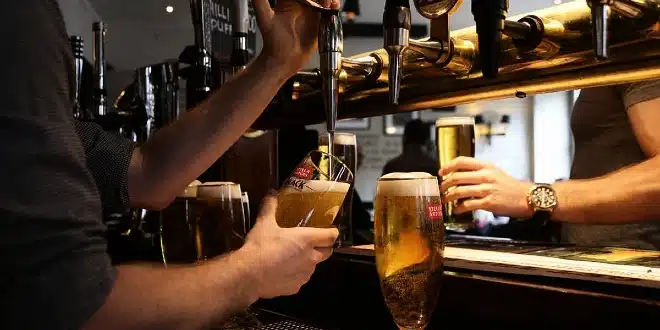A new 18-hour ban on alcohol advertising during key daytime hours has officially come into effect, targeting TV and radio broadcasts. Under the new rules, alcohol ads are prohibited on television from 3 a.m. to 9 p.m. and on radio from 3 p.m. to 10 a.m. on weekdays. This measure, introduced under Section 19 of the Public Health (Alcohol) Act 2018 (PHAA), comes seven years after the legislation was signed into law.
Advocates of the ban hope it will reduce children’s exposure to alcohol marketing, which is seen as a significant factor in early alcohol use. Alcohol Action Ireland (AAI) has described the move as long overdue, citing the high levels of alcohol consumption in Ireland—currently 40% above the HSE’s lower-risk guidelines.
Dr. Sheila Gilheany, CEO of AAI, commended Ireland’s leadership in implementing the PHAA, a set of measures aimed at protecting public health from aggressive alcohol industry marketing. She noted that since the law was passed, per capita alcohol consumption has dropped by 10%, but emphasized that alcohol still claims over 1,500 lives annually in Ireland.
Despite progress, not all sections of the PHAA have been implemented. Key provisions, such as Section 13, which would restrict alcohol advertisement content to factual information, and Section 18, which governs alcohol ads in publications, remain unenforced. Dr. Gilheany criticized the delays, attributing them to lobbying efforts by the alcohol industry. Section 13, in particular, has faced strong resistance as it would strip advertisements of myths that glamorize alcohol use. Additionally, future ads will be required to include health warnings, such as the link between alcohol and cancer, as well as information about the HSE’s alcohol awareness resources.
Dr. Gilheany stressed the importance of fully implementing all sections of the PHAA for the legislation to achieve its intended public health benefits. She called on the incoming government to prioritize the act’s completion, citing public support for stricter alcohol controls, with polling indicating over 70% approval.
Concerns remain over loopholes in the legislation, such as the continued allowance of daytime advertising for non-alcoholic beverages from alcohol brands, which health advocates argue undermines the law’s purpose. AAI has urged Ireland to follow Norway’s example, where alcohol advertising is entirely banned, including the use of identical branding for non-alcoholic products.
Additional areas of concern include alcohol advertising in publications and on social media platforms, which are particularly effective in reaching young people. AAI noted that Diageo is currently one of the largest advertisers to children in Ireland, a claim the company denies, stating that it adheres to strict advertising regulations and does not target minors.
The National Youth Council of Ireland also called for stronger measures, emphasizing the pervasive influence of advertising on young people, particularly through digital platforms. Kathryn Walsh, representing the council, highlighted the need for stricter controls to protect children and adolescents from harmful marketing practices that contribute to unhealthy consumption patterns.
 The Daily Star Ireland
The Daily Star Ireland

